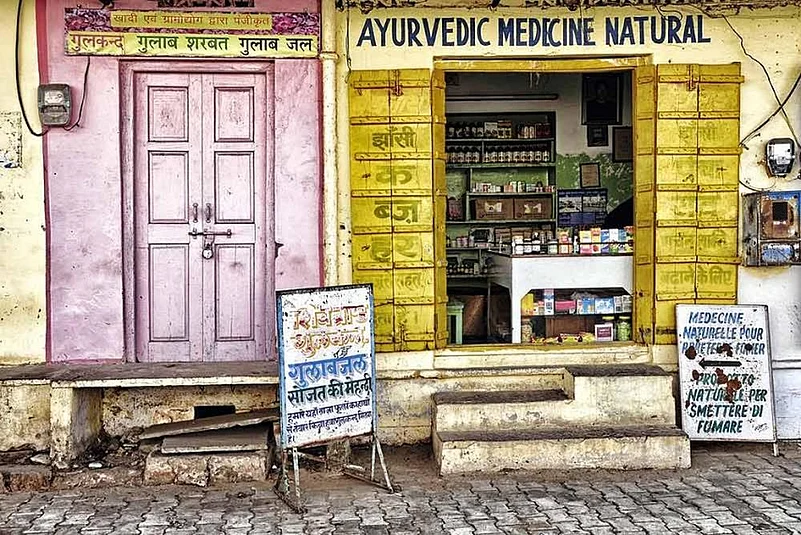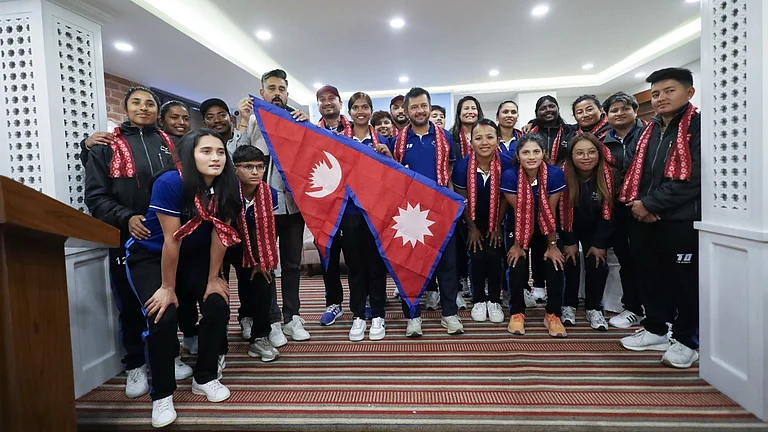The clash between practitioners of traditional medicines and allopathy continues leaving the common man confused about the efficacy of remedies to boost immunity, treat common cold and other minor ailments to treatment for recovery after a fracture to even rehabilitation after a stroke. Dr Apurve Mehra, founder of Biogetica, which holds a patent for a faster and effective treatment of herpes, in an interview tells Outlook's Lola Nayar that the whole debate is pointless as each school of medicine has something to offer in developing more effective medicines.
There are many skeptics of alternate medicines particularly among allopathic doctors. How do you and your group of doctors tackle this? Is there any ongoing effort to authenticate the efficacy of your medications and treatment?
The term alternate medicine needs to be eradicated. We should instead call it the original medicine as history will vouch for the fact that for thousands of years, human beings have relied on nature for medicines. It is only in the last hundred years that pharmaceuticals have taken over medicines. Anyone who believes that pharmaceuticals are the only medicine is welcome to prove their point by living off pharmaceutical medicines and vitamins in place of natural food for a month.
While we use natural products, pharmaceuticals produce molecules to mimic natural products. For instance, marijuana, which is considered a medicine in the US, is not used in its original form but instead pharmaceuticals have created Marinol, a synthetic derivative approved by the FDA. Similarly, many malaria, blood pressure and anxiety medications are derived from nature. It's not that the natural molecule did not work, or is not supported by science. It is just that nature cannot be patented and, hence, no one wishes to prove it to the authorities.
At Biogetica, our experiments have proven that nature can support pharmaceuticals and even outperform them. The original live molecule in all the perfection of nature is better for you in the long run.
Can you cite any instances to support the claim that traditional medicines can support and even outperform allopathic medicines?
The last two studies we have published on herpes (a virus causing contagious sores, most often around the mouth or on the genitals) and trigeminal neuralgia (a nerve responsible for sensation in the face and motor functions such as biting and chewing). In the case of herpes, an episode normally lasts for about four weeks. A very popular anti-viral helps to reduce the episode to 10 days and sometimes to two weeks. We have produced a combination therapy which is 100 per cent natural that helps to reduce the herpes episode to just three days. We have a patent for our product both in India and in the US and our groundbreaking study on herpes has been published and peer reviewed.
In the case of trigeminal neuralgia, often called the suicide disease, an estimated one in five people who get this disease tend to commit suicide, being the most painful condition known to man, much worse than any headache, backpain or even a broken bone. While gamma knife surgery treatment for the disease was helping 44 per cent of the patients, our treatment protocol has been known to help 68 per cent of the patients to become pain free. There is a cost advantage too as a surgery can cost about R .5 lakh, our treatment using natural products costs around Rs 5000.
Though as in the case of herpes, the episode may get over within days, we advise ayurvedic treatment for 160 days to be able to eliminate the root cause of the disease. Unlike in allopathy, we don’t just focus on symptoms. While pharmaceuticals make trillions every year, we don’t make even a billion dollars every year. But what makes it worth it are the letters we get from different parts of the globe thanking us for the products that have made a difference in their lives.
We often hear criticism that many of the ayurvedic medicines contain harmful hormones and steroids and some also contain high levels of metals. How true is this charge?
The hormones and steroids don’t come from Ayurveda, but is due to adulteration of these medicines. Hormones and steroids are native to allopathy and prescribed openly. We ensure our medicines are adulteration free. They are in fact organic in nature.
In terms of health and nutrition, how well do your medicines serve?
Our medicines work on three levels in the body. One is molecular level, which are like raw material required by the body to produce something. This concept comes from Western medicine. The second layer comes from what we have learnt from Ayurveda and Chinese and Tibetan medicines about how to balance the five elements of the body. The third layer comes from the Vedic saying “amritasya putraha” or children of immortality. So, our effort is to help you align your body to negentropic soul archetypes to heal the body. We have learnt from Western medicine what are the nutrients required to help a diabetic patients’ body produce insulin to metabolise sugar, while from Ayurveda we know the balance of five elements that has to be created in the body to make it conducive to produce insulin.
Similarly, homeopathy offers sarcodes of insulin, which serves like a mirror for the body. Where we differ from other practitioners of different medicines is that we strive to put together the best of various options to offer best treatment.
Are you coming out with any study to address fears of non-believers in traditional medicines?
We have already come out with many such studies but unfortunately people will believe what they want to believe in. The fact is that every system of medicine has strengths. But this strength becomes a weakness when the practitioner says ‘my way or the highway’.
Every medical practice has a time and place. It is important to make the right choice. For instance, in the case of a bone fracture it is important to go in for surgical care but after that one can choose from among traditional medicines and allopathy to strengthen the reset bone right from intake of calcium to other alternatives. Unfortunately, nobody is positioning themselves to serve patient needs, and instead opt to stick to what they have learnt in their medical studies and harbor skepticism for any other system of medicine. Over time and especially now during this pandemic, it is obvious that the time has come for doctors to come together and learn from each other.





















.jpg?w=200&auto=format%2Ccompress&fit=max)




